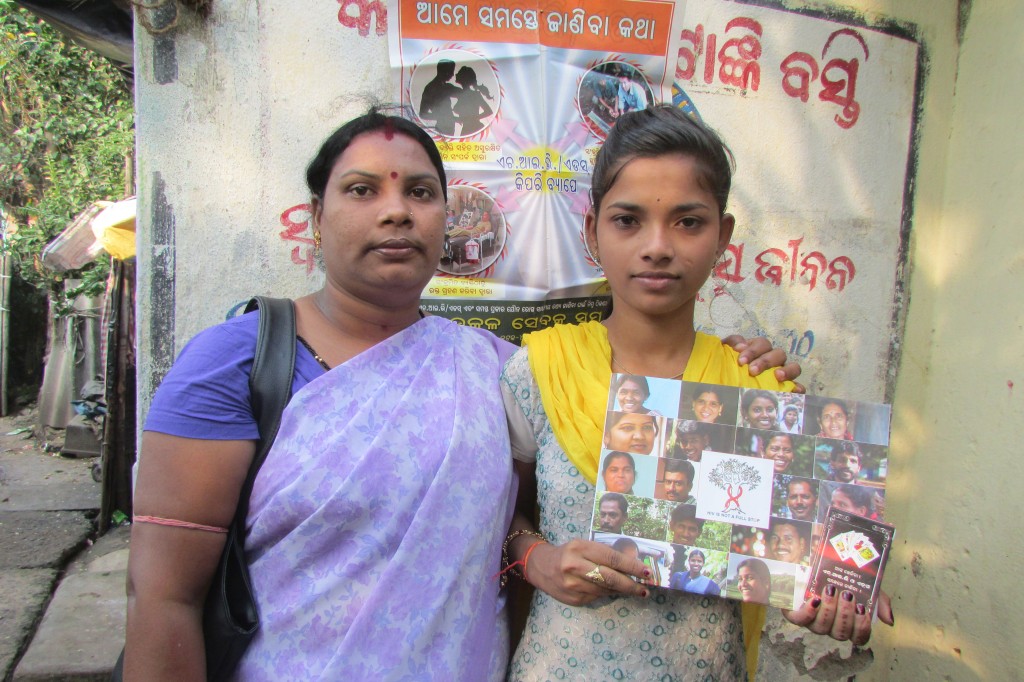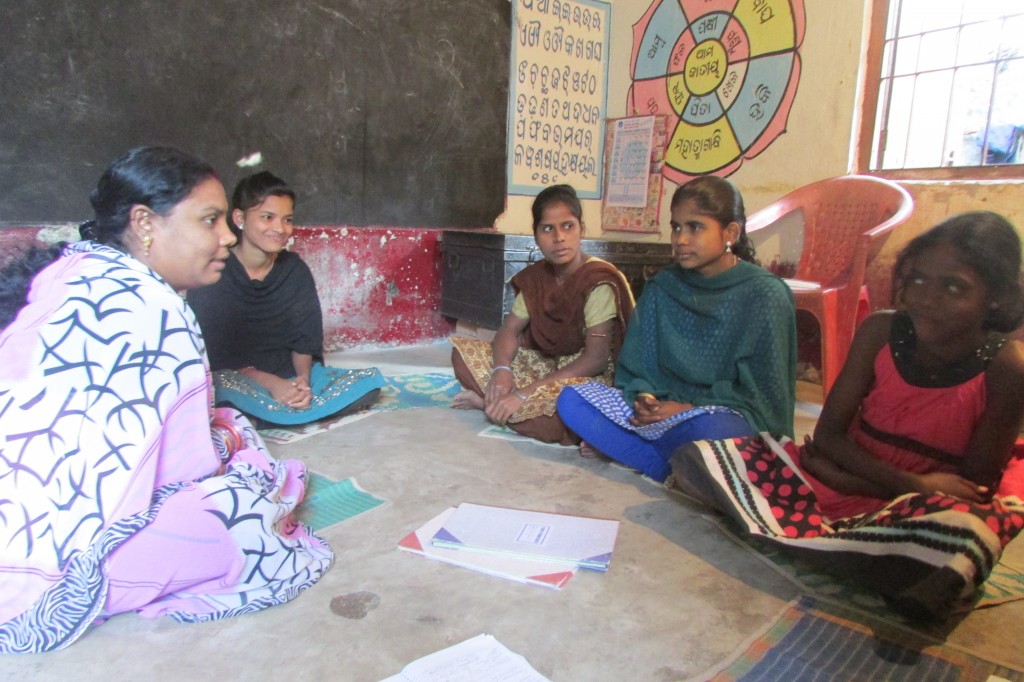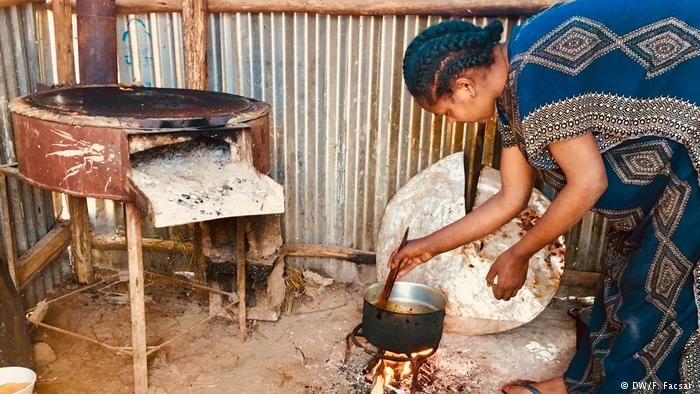Talking about Safe Sex with Teens

Counsellors like Laxmipriya (left) have enabled several adolescent girls living in slums of Bhubaneswar to understand the merits of safe sex. (Copyright: Rakhi Ghosh\WFS)
Pooja Behara (name changed), 16, would probably have never realised that she was suffering from a sexually transmitted disease (STD) had Sabita Buta, a counsellor with a local non government organisation, not come into her cramped slum in Bhubaneswar, the state capital of Odisha, to talk to the adolescent children about HIV/AIDS and the importance of safe sex, sometime early last year. Buta recalls, “When Pooja walked up to me she did not open up right away. So I began by asking her to tell me a little about herself. Only after spending a few days did she gain the confidence to tell me her story.”
What the teenage girl told Buta was quite alarming. Pooja was only 14 when she was forced into a “relationship” with a man twice her age. That was just the beginning. Soon, the youngster realised that trading sexual favours with vendors and grocers in the area was the one way in which she could ensure some basic rations and vegetables for her severely impoverished family. There were times when she thought about saying ‘no’, but then she felt she didn’t really have a choice – if she didn’t do it consensually she ran the risk of being sexually assaulted.
“She told me that she had had multiple partners but she did not use any protection. She simply did not know about it. Then, she told me that she was not keeping well. When I asked her to describe the symptoms I figured that she was suffering from a STD. She got tested and then sought proper treatment. Now, a year later, she is well. And the best part – she doesn’t indulge in unprotected sex,” shares Buta.
Like Pooja, nearly 60 to 70 per cent adolescents living in slums scattered across the city become sexually active at an early age for different reasons. Elaborates Buta, “For girls, most often it is poverty that forces them into keeping sexual relations with several partners, most of whom are older to them. Their fathers usually squander their meagre earnings on alcohol leaving the mother and the eldest daughter with the responsibility of meeting the expenses and keeping the household going.”
Apart from this dismal reality there are other factors, too, that contribute to the teens indulging in risky behaviour. Benudhar Senapati, a veteran child rights activist, who has been working with adolescents for the last 25 years, says, “If you visit any slum, you will find that most families live in rooms no bigger than 10×12 feet. So, by default they are exposed to sex at a very early age.”
Sometime in 2008, Senapati had conducted an extensive survey among teens across 11 slums in Bhubaneswar, in addition to those living on the streets and in railway stations, to study their sexual behaviour. “We spoke to 1,187 children between eight to 18 years of age. Around 57 per cent boys and 47 per cent girls admitted to having consensual sex,” he says. The findings further revealed that girls in slums wanted to settle down early because they thought marriage would be their way out of their painful and exploitative existence. “The sad part is that they are keen to marry early to live that perfect life, which they soon realise is just a myth. There is no escaping from the abuse,” he adds.
Dr Soumyakant Mishra of Save the Children, a non profit that works with youngsters on issues related to education, health, anti-trafficking, and sexual exploitation, agrees with Senapati’s observations. He says, “Mostly it is their lifestyle and poor standard of living that contribute towards the high risk sexual behaviour noticeable among adolescents in slums.”
Giving a psychologist’s perspective is Prof Sangeeta Rath, who believes that whereas it’s normal for all teens to have raging hormones what turns out to be a major disadvantage for those hailing from poorer homes is the lack of proper guidance. “It’s typical for teens to develop a desire for sex. Their curiosity often gets the better of them and they do experiment.
But children living in the shanties are far more vulnerable to contracting diseases or getting saddled with unwanted pregnancies. Low parental guidance along with a decided lack of proper education and awareness makes them unknowing victims as they are ill prepared for the consequences of their risky behaviour,” she explains.

Having the “protection” of information and awareness on HIV and Sexually Transmitted Diseases (STDs) can make a big difference to their already vulnerable lives of teenagers living in slums dotting Bhubaneswar, Odisha. (Credit: Rakhi Ghosh\WFS)
What can make a real difference to their lives is if they have the “protection” of information and awareness. With this in mind, Ruchika Social Service Organisation (RSSO), a local NGO, has been running a Red Ribbon Friend campaign in 30 slums in the city. Elaborating on this initiative, Senapati says, “We have built a cadre of 250 Red Ribbon Friends, who are essentially adolescents identified from within their own neighbourhoods and intensively trained to spread awareness on HIV and other health related issues. These youngsters talk to their friends and peers about the stigma and discrimination attached to HIV and Sexually Transmitted Infections (STIs). Moreover, they play an active role in linking those suffering from STIs with government health care providers.”
Activists of RSSO have helped in creating five effective groups – adolescent boys, adolescent girls, youth male, youth female and a mobile group – that reach out to the children as well as their sexual partners with relevant information. “The Red Ribbon Friends have been extensively spreading awareness on safe sex and the use of condoms,” says Senapati.
Councellors like Sabita Buta and Laxmipriya Behara are enabling the Red Ribbon Friends to efficiently do the task assigned to them. Behara explains, “The knowledge sharing takes place according to the average age of the group members. The teenage boy and girl groups have been further divided into a junior lot – for children between 13 and 15 years – and senior one – for those between 16 and 19 years. We encourage the Red Ribbon Friends to give basic information on HIV to the juniors, while the older lot is given a more extensive talk on using precautions and the repercussions of this fatal disease.”
However, in both Buta and Behara’s experience getting through to the children is not easy. “There are many challenges involved. For starters, convincing them share the intimate details of their life is difficult. The Red Ribbon Friends have managed to create a more conducive environment to address HIV and other related issues,” says Behara. (From Women’s Feature Service)
Author: Rakhi Ghosh
Editor: Marjory Linardy
This article is a part of Child Survival Media Award-2014 fellowship by NFI in collaboration with Save the Children
WTO RECOMMENDS
A mother’s dilemma
Nearly 1.2 million people in Ethiopia are infected with the deadly Human Immunodeficiency Virus, also known as HIV. Women and young girls are particularly under threat because of social, political and economic discrimination.
Empowerment, Not Violence Against Women
When we hear the phrase “women’s issues,” numerous issues and problems come to our minds and most of the problems have been prevalent for centuries. In spite of the plans and policies at national and international levels, no substantial work has been done for the elimination of these issues from women’s lives.
Heal yourself
Why do some communities seem to tolerate or at least, serve as breeding grounds for sexual assault? What can victims do after the incident has happened? How can a victim learn to deal with flashbacks and return to normal life? Women Talk Online blogger Beenish Javed spoke to Carolyn Worth, manager at the South Eastern Centre against Sexual Assault Melbourne Area (SECASA), Australia.






